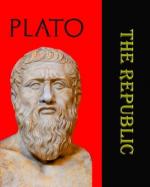|
|
The Republic Objects/Places
Piraeus: The place where Socrates and Glaucon go to watch the procession and festivities, after which they meet up with Polemarchus and the others.
Justice: The debate of the whole book. Socrates and the others spend their time deliberating over what justice is, and whether the just life is happier than the unjust life.
City: In order to discover true justice in a person, Socrates builds an imaginary city and determines what justice is there. This is because it is easier to identify and explain things on a large scale than a small one. Thus, he bases the book on the city.
Gods: It is assumed that gods can do no harm or injustice, despite what poets say. The gods also reward the just and punish the unjust, whether in this life or the afterlife.
Wisdom: This comes from good judgment and is one of the four excellences. It is also what creates a philosopher, as philosophers are people who are in love with wisdom.
Courage: Another one of the excellences, it is the power to preserve the opinion of what is and is not to be feared, under all circumstances. The guardians represent courage in the city.
Temperance: Defined as control over certain desires and pleasures, it is another one of the excellences to be found in both the soul and the city. Temperance exists in all people in the city, and its existence is proven by the harmony.
Philosophers: People who love knowledge. Socrates also says that nobody will be happy until either philosophers become kings or kings become philosophers. Also, true philosophers will realize that there is more than human life to be considered.
Sophists: People who preach opinion, as oppose to wisdom, which they say they preach. They are unworthy of philosophy and unsuited to its education.
Cave: Socrates uses the story of the cave to show how people often believe that something is the truth when it is not, and also to show how difficult it is for people to admit that what they have believed is not the truth, but that something else is.
Truth: The search for the truth, and for what is, leads to the definition of the good, which in turn leads to the definition of justice. Socrates and the others conclude that people who see the truth are better than those who don't, and that it is the soul that sees the truth.
Aristocracy: Similar to a kingship, this is found to be the best system of ruling, and the aristocratic man is the best and most just man.
Timocracy/Timarchy: This arises from the aristocrac, and occurs when the aristocracy deteriorates. It has many features similar to aristocracy and many different ones. This is considered the second best method of rule, and the timocractic man is considered the second best and just.
Oligarchy: This comes about when timocracy deteriorates. It has similar features to timocracy, but it is different to it in many ways.
Democracy: This stems from oligarchy, when people want to get as rich as possible. Although it shares some features with oligarchy, it is very different. It is considered one of the worst methods of rule, and the democratic man is considered rather unjust.
Tyranny: The worst regime, this stems from democracy. It shares some features with democracy, but it is very different. The tyrant is considered the most unjust man, and the unhappiest.
Desires: There are two types of desires: necessary and unnecessary. It is the lack of control over unnecessary desires which make people less just. Desires can be wild, terrible and lawless, and lead people to do unjust things.
Imitation: Not allowed in the city, imitation is considered to be a waste of time and harmful to people, because it makes them feel fake emotions.
Guardians: Protectors of the city and the exhibition of courage in the city. The best guardians will become rulers, alternating their rule. Their upbringing is very rigid, and they are considered to be among the best people in the city.




